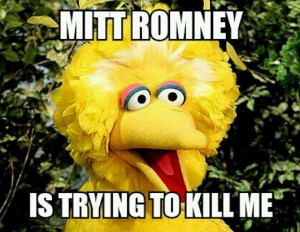America: where the fate of a big, yellow, costumed bird takes center stage in a presidential election
 Since Mitt Romney declared that he would cut funding to PBS during last week’s presidential debate, whether or not taxpayers should continue to fund public educational TV programs like Sesame Street seems to have become one of the key issues surrounding the coming election. Facebook and Twitter are both abuzz with people bickering over the issue. Obama’s camp even released a (somewhat tongue-in-cheek) campaign ad dedicated to attacking Romney over his comments.
Since Mitt Romney declared that he would cut funding to PBS during last week’s presidential debate, whether or not taxpayers should continue to fund public educational TV programs like Sesame Street seems to have become one of the key issues surrounding the coming election. Facebook and Twitter are both abuzz with people bickering over the issue. Obama’s camp even released a (somewhat tongue-in-cheek) campaign ad dedicated to attacking Romney over his comments.
Whether you’re a fan of Sesame Street or not (and really, who isn’t?), anyone taking part in a debate over whether or not PBS should continue to receive public funding is probably an uninformed idiot. Romney should have been laughed off the stage for even mentioning Sesame Street last Wednesday—cutting funding to PBS is essentially the equivalent of the average American family holding a serious discussion over whether or not they should cut one cup of coffee out of their entire yearly budget in order to help them overcome hundreds of thousands of dollars of debt. It’s simply idiotic.
The Corporation for Public Broadcasting (which encompasses PBS, NPR, and other public media) receives about $500 million from the federal government every year. Sound like a lot? The annual federal budget is approximately 3.5 trillion dollars. In other words, PBS and NPR together receive about 0.0001 percent of our tax dollars.
So why is America focused on bickering over what essentially amounts to a laughably trivial piece of the federal budget when there are so many other important issues to debate? A Politico article written last year may shed some light on the subject. The article focused on a CNN poll that asked respondents how much federal funding they believed public broadcasting receives. Perhaps unsurprisingly, Americans were embarrassingly uninformed when it came to matching the actual figures. From the article:
Forty percent of those polled believe funding the [Corporation for Public Broadcasting] receives takes up 1 to 5 percent of the budget, 30 percent believe public broadcasting takes up 5 percent or more of the budget and 7 percent of respondents believe the non-profit receives 50 percent or more of the federal budget.
The poll results suggest that more than a third of Americans believe that the federal government is spending $175 billion or more on public TV and radio every year. These people are literally overestimating by thirty-five thousand percent. They’re fantastically wrong; they’re not even in the realm of what might be considered an educated guess. Even the people that believe we’re spending a more-plausible one percent of the federal budget on PBS are off by a factor of a hundred. According to the poll, three-quarters of Americans appear to be absolute idiots when it comes to having a realistic idea of where their tax dollars are going.
These are the people that are going to rally behind Romney’s promise to fix the economy by cutting Sesame Street. In their minds, hundreds or thousands of hard-earned tax dollars are being taken from their pockets every year to keep Big Bird on the air, when the simple fact is that PBS costs the majority of Americans less than a buck annually. The gap between Romney’s implication and reality is absurdly large.
In the end, we’re left with just another example of why democracy isn’t a very good system—it’s easy for an objectively terrible candidate to convince uneducated masses to support him. People simply don’t know any better.
Recent Comments